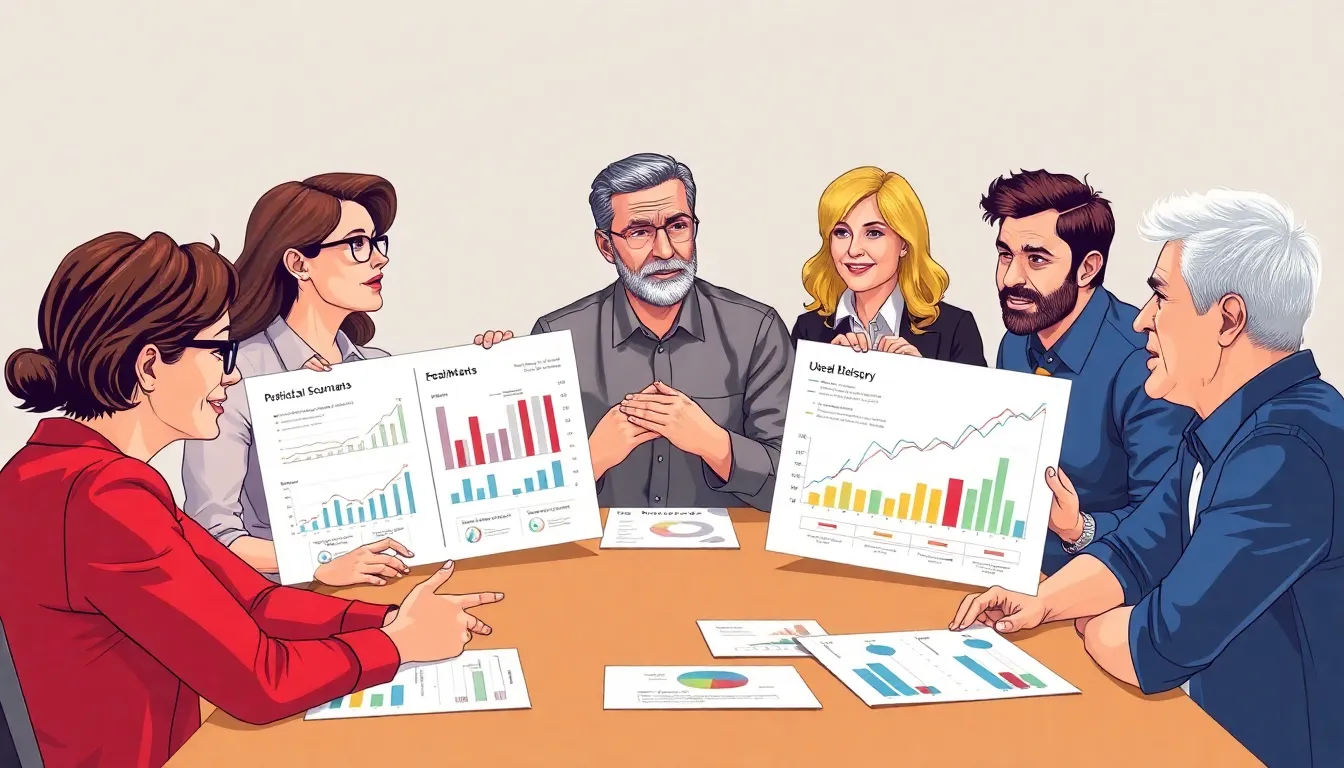Political ideology shapes the way people view the world and influences their decisions, often more than they realize. It’s like the secret sauce in a recipe; without it, the dish just doesn’t taste right. From the fiery debates in coffee shops to the heated discussions at family gatherings, understanding political ideologies can help navigate the often chaotic landscape of opinions and beliefs.
Table of Contents
ToggleWhat Is Political Ideology?
Political ideology comprises a set of beliefs and values regarding the organization and governance of society. This framework shapes how individuals understand political systems and social structures. It encapsulates perspectives on issues such as justice, rights, and the role of government.
Various types exist within political ideology, including liberalism, conservatism, socialism, and libertarianism. Each ideology proposes different solutions to societal issues, aiming to meet the needs of its followers. Liberalism emphasizes individual freedoms and equal opportunities. Conservatism prioritizes tradition and social stability. Socialism advocates for collective ownership and economic equality. Libertarianism champions minimal government intervention in personal liberties.
Ideologies are not static; they evolve with societal changes and shifts in public sentiment. Changes in demographics, economic conditions, or technological advancements can influence ideological perspectives. Understanding these changes helps individuals navigate political conversations effectively.
Political ideologies also inform policy-making and influence voter behavior. Voters often align their choices with ideological beliefs, which directly impact election outcomes and governance. Acknowledging these connections enables meaningful discussion about political landscapes.
Moreover, political ideology affects how communities engage with one another. They provide a shared vocabulary and context for discussing values and priorities. Recognizing ideological differences fosters dialogue and enhances mutual understanding. This understanding is vital in today’s diverse political environment, where multiple viewpoints coexist.
Key Components of Political Ideology

Political ideology features several key components that shape societal understanding and governance. Two fundamental aspects include values and beliefs, along with social and economic theories.
Values and Beliefs
Values represent core principles guiding individuals’ thoughts and actions. Beliefs stem from these values, forming the foundation of political ideologies. Different ideologies express varied priorities, such as equality in socialism or individual freedom in libertarianism. Individuals align their convictions with ideological stances, impacting their political preferences. The significance of shared values fosters unity among like-minded individuals while driving collective action for social change. Groups rallying behind specific values often influence public policy by advocating for legislation that aligns with their beliefs.
Social and Economic Theories
Social and economic theories underpin the practical application of political ideologies. These theories provide frameworks for understanding how societies function. For instance, capitalism promotes free markets, emphasizing competition and individual success, while socialism advocates for equitable distribution of resources. Each theory suggests distinct approaches to societal challenges, focusing on wealth redistribution, government intervention, or free enterprise. Political ideologies often blend these theories, resulting in hybrid models like social democracy. Discussions around these theories shape public discourse, guiding perceptions of fairness, equity, and justice within political systems.
Major Political Ideologies
Political ideologies play a fundamental role in shaping governance and societal organization. Various ideologies offer distinct approaches to addressing political and social issues.
Liberalism
Liberalism prioritizes individual freedom and equality. Central ideas include human rights, democracy, and market economy. Proponents advocate for government intervention to promote social justice. Economic policies typically focus on a balance between free markets and regulations. Additionally, liberalism emphasizes civil liberties, ensuring personal freedoms are protected within society. This ideology encourages progressive change, adapting to evolving social norms.
Conservatism
Conservatism values tradition and social stability. Advocates emphasize the importance of established institutions, family, and national heritage. Economic policies lean towards free-market principles, stressing minimal government interference. Additionally, conservatives often prioritize individual responsibility over state intervention. This ideology expects gradual change, arguing that abrupt transformations can destabilize society. Respect for authority and rule of law serves as a foundation.
Socialism
Socialism aims for collective ownership and equitable distribution of resources. This ideology emphasizes social equality and advocates for the welfare state as a means to support citizens. Economic policies often involve significant government control over key industries. Moreover, socialism promotes active state involvement to reduce inequality and improve living conditions. Various forms exist, ranging from democratic socialism to more authoritarian approaches. Community well-being stands as a central tenet.
Communism
Communism envisions a classless, stateless society where all property is commonly owned. It seeks to eliminate private ownership and redistribute wealth to eradicate social classes. Central planning typically replaces market mechanisms in a communist economy. This ideology views capitalism as a source of exploitation and social conflict. Historical examples often depict authoritarian regimes implementing these principles. Ultimately, the goal remains establishing a society based on equality and communal cooperation.
The Role of Political Ideology in Society
Political ideology plays a crucial role in shaping both governance and public policy. It influences how societies organize, allocate resources, and respond to citizens’ needs.
Influence on Governance
Governance reflects the beliefs inherent in political ideologies. Liberalism promotes social justice through government intervention, creating policies for equality. Conservatism favors limited government, emphasizing individual responsibility and tradition in decision-making. Socialism leans toward collective ownership, advocating for systems that reduce inequality and support citizens welfare. Communism envisions a classless society, seeking to eliminate private ownership and establish egalitarian structures. Each ideology’s approach determines the efficiency and effectiveness of governance across different contexts.
Impact on Public Policy
Public policy arises from political ideologies, shaping diverse areas such as healthcare, education, and taxation. Liberal policies often prioritize universal access to services, ensuring support for vulnerable populations. Conservative approaches focus on tax cuts and limited regulations, aiming to stimulate economic growth. Social policies under socialism push for equitable access, emphasizing welfare and meaningful support systems. The influence of ideologies extends to laws that affect daily life, guiding how nations address critical social issues. Understanding these connections fosters awareness of the underlying motivations behind various public policies.
Political ideology serves as a foundational element in understanding how individuals and societies function. It shapes not only personal beliefs but also influences broader discussions about governance and policy-making. Recognizing the diverse ideologies at play can lead to more informed conversations and a deeper appreciation for differing viewpoints.
As political landscapes continue to evolve, staying aware of these ideologies will be essential for navigating the complexities of modern society. Engaging with various perspectives fosters dialogue that enhances mutual understanding and encourages collaborative approaches to societal challenges. Ultimately, grasping the nuances of political ideology empowers individuals to participate more actively in shaping their communities and influencing the future.




